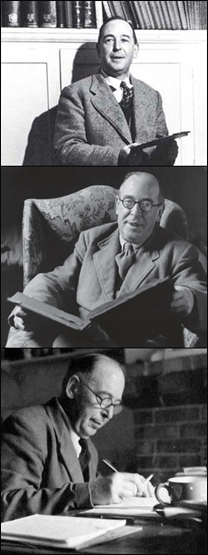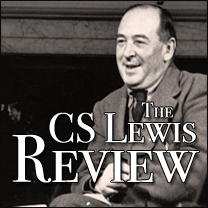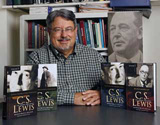
What It’s Like, This Writing Life
September 22nd, 2005 | Skip to comments
My second book on Narnia, Further Up and Further In: Understanding C. S. Lewis’s The Lion, the Witch, and the Wardrobe, is now out, got my first author’s copy yesterday; the bookstores should have it by the end of the week or sooner. The publicity trail is starting up. I got a big package yesterday from Disney filled with posters and doorknockers and various kinds of handouts.
And today I was interviewed by Religion News Service and their Sarah Price Brown, for a story on the film and Lewis’s legacy. I was told she had spoken to Doug Gresham this morning and now wanted “an academic side to the story.” In some ways, she was asking in many ways and over and over if evangelical folk don’t “worship” Lewis a little too much.
It went like something like this (as I remember it):
Sarah:
How do you explain Lewis’s legacy?
Me:
There are three Lewis audiences, and thus three legacies to talk about. The first is the scholarly legacy, and his work on allegory and medieval tradition is still potent and vibrant, and both starting and settling many debates. The second audience is science-fiction and fantasy readers, who will rediscover the Space Trilogy once the Narnia movie arrives, and re-appreciate what was packed into the landscapes of Narnia. On the other hand, the real legacy of Lewis in this realm may be in the readers (and writers) his work inspired. Flannery O’Connor was once asked if the church didn’t discourage writers. She said: “It doesn’t discourage enough of them. . .” That’s sort of the way I feel about this aspect of Lewis. For every Harry Potter he inspired, there’s a really bad Sci-fi novel with Christian imagery ladled over it. But I am glad that someone tries. The key to Lewis’s success is that the Christianity is incarnate in the story, not an add-on. The third audience is those who read for the Christian apologetics. This legacy continues to grow, in spite of the fact that Lewis has been dead 42 years and most writers’ works don’t keep influencing beyond a decade after they pass on. So how do we explain it? Two answers. One is, no one has arisen on either side of the Atlantic to surpass what Lewis accomplished in so many genres. That is not a good sign, of course, since it means even though he gave us the tools and the example, we have not carried on his mission well. The second issue is that it may mean that Lewis’s response to his age still carries merit, weight, and volume, and is still effective “as is,” though it may need some translation here or there.
Sarah:
But what about his appeal, his extraordinary appeal among evangelical; isn’t he, as Doug Gresham told me in his interview today, in “danger of becoming a plastic saint”?
Me:
No one would be more surprised by nor more humbled by his celebrity and acclaim. His constant theme was that he was standing on the shoulders of giants-and transmitting a legacy of apostolic tradition that we should already know. His innovation, if he conceded, it was helping us “steal past the watchful dragons” of conventional wisdom and popular sentiment, and see Christianity as it is: the grand miracle of incarnation of the original Author. I deny that evangelicals “own” Lewis-or think of him in a completely credulous way, with no distance or perspective. Evangelicals have as much integrity and ability to discern truth from error as anyone else. Lewis is himself NOT an evangelical; doesn’t qualify by most evangelical traditions on Scripture, e.g., and I suspect he would not like much of what passes as worship or sermonizing, but then he did not much like anything in his local parish either. But he is not a snob. He would understand seeker-sensitive outreach, and epitomized in his own era, and with his own predilections.
Sarah:
Yes, but isn’t there a lot of hero worship involved?
Me:
Yes-there is. But is having someone, like Lewis, as a hero so bad? To find him heroic and worth emulating, reaching for the levels of achievement and skill-but most of all, consistency of faith and integration of mind, soul, and spirit, isn’t this just finding a spiritual mentor in whom you can place your trust? I agree that we should not place Lewis on a pedestal as infallible or perfect, but neither should his stature be denied or despised, as I think it sometimes is, in and out of evangelicaldom.
Sarah:
How would he want to be remembered?
Me:
For his posture on mere Christianity-the core beliefs, minus denominational idiosyncrasies. He wept over the divisions of the faith–and sought a way to bring Christians together on the most important aspects of it. The work and person of Jesus Christ is paramount in all that he wrote post-conversion. It’s every page of Mere Christianity, Narnia, Miracles, Screwtape, Great Divorce. It’s to his Lord he would point us, not to him. And to that I say “Amen.”
Where will the story run? What will the story look like when she’s done? I don’t know. Many places-it is a syndicated column, so it is likely to show up in newspapers around the U.S. and abroad. If you read this blog and see it in your local paper or on an electronic version of the paper, please send me an email and the URL. Kind of a “message in a bottle” and fun to see who sees it and where. And how I am quoted in the final version.




Comments
No comments yet.
RSS feed for comments on this post.
Sorry, the comment form is closed at this time.